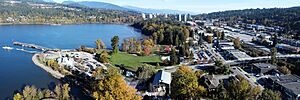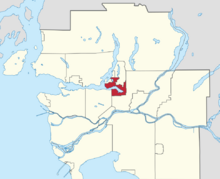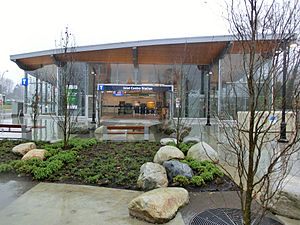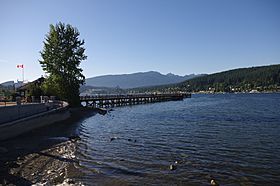Port Moody facts for kids
Quick facts for kids
Port Moody
|
|||
|---|---|---|---|
| City of Port Moody | |||

Port Moody Centre and Rocky Point Park
|
|||
|
|||
| Nickname(s):
PoMo
|
|||
| Motto(s):
City of the Arts
|
|||

Location of Port Moody in Metro Vancouver
|
|||
| Country | Canada | ||
| Province | British Columbia | ||
| Regional district | Metro Vancouver | ||
| Incorporated | |||
| • Town | 1859 | ||
| • City | 11 March 1913 | ||
| Named for | Richard Moody | ||
| Government | |||
| • Type | Mayor-council government | ||
| • Body | Port Moody City Council | ||
| Area | |||
| • Land | 25.85 km2 (9.98 sq mi) | ||
| Elevation | 40 m (130 ft) | ||
| Population
(2021)
|
|||
| • Total | 33,535 | ||
| • Estimate
(2023)
|
39,316 | ||
| • Density | 1,297.3/km2 (3,360/sq mi) | ||
| Time zone | UTC−8 (Pacific Standard Time) | ||
| • Summer (DST) | UTC−7 (Pacific Daylight Time) | ||
| Forward sortation area |
V3H
|
||
| Area codes | 604, 778, 236, 672 | ||
Port Moody is a city in British Columbia, Canada. It is part of the Metro Vancouver Regional District. The city is located at the east end of Burrard Inlet. It is the smallest of the Tri-Cities, which also include Coquitlam and Burnaby. Port Moody is named after Richard Clement Moody, who was the first Lieutenant-Governor of the Colony of British Columbia.
Contents
History of Port Moody
Port Moody was named after Colonel Richard Clement Moody of the Royal Engineers. These engineers were a special group of soldiers who built important structures. The town was first created to protect New Westminster from possible attacks. It grew quickly after 1859.
The Railway Arrives
British Columbia joined Canada in 1871. A major condition for joining was the building of a transcontinental railroad. This railroad would connect Canada from coast to coast. In 1879, Port Moody was chosen as the western end of the Canadian Pacific Railway.
By 1881, the town began to be officially mapped out. Many streets were named by John Murray Jr. after his family members. The population grew very fast in the early 1880s. A contractor named Andrew Onderdonk built a large wharf and started laying railway tracks from Port Moody in 1883.
The railway was finished on November 7, 1885. The first train arrived in Port Moody the very next day. Everyone thought Port Moody would become a huge city on the West Coast. Land prices went way up!
Changes and Growth
However, in 1887, a new railway line was built to Vancouver. This new line was about 12 miles (19 km) long. Many people who had invested in Port Moody lost money and moved away. But some people, like James A. Clarke and several lumber companies, decided to stay. On April 7, 1913, Port Moody officially became a city.
Port Moody's Weather
| Climate data for Port Moody (1981–2010) | |||||||||||||
|---|---|---|---|---|---|---|---|---|---|---|---|---|---|
| Month | Jan | Feb | Mar | Apr | May | Jun | Jul | Aug | Sep | Oct | Nov | Dec | Year |
| Record high °C (°F) | 16.5 (61.7) |
19.0 (66.2) |
24.0 (75.2) |
28.0 (82.4) |
34.5 (94.1) |
33.5 (92.3) |
35.0 (95.0) |
34.0 (93.2) |
32.5 (90.5) |
28.0 (82.4) |
19.0 (66.2) |
15.5 (59.9) |
35.0 (95.0) |
| Mean daily maximum °C (°F) | 6.3 (43.3) |
7.5 (45.5) |
10.2 (50.4) |
12.9 (55.2) |
16.7 (62.1) |
19.3 (66.7) |
22.2 (72.0) |
22.7 (72.9) |
19.1 (66.4) |
13.6 (56.5) |
8.3 (46.9) |
5.6 (42.1) |
13.7 (56.7) |
| Daily mean °C (°F) | 3.9 (39.0) |
4.6 (40.3) |
6.8 (44.2) |
9.1 (48.4) |
12.5 (54.5) |
15.2 (59.4) |
17.6 (63.7) |
18.1 (64.6) |
15.0 (59.0) |
10.4 (50.7) |
6.0 (42.8) |
3.3 (37.9) |
10.2 (50.4) |
| Mean daily minimum °C (°F) | 1.4 (34.5) |
1.6 (34.9) |
3.4 (38.1) |
5.3 (41.5) |
8.3 (46.9) |
11.0 (51.8) |
13.0 (55.4) |
13.4 (56.1) |
10.8 (51.4) |
7.2 (45.0) |
3.6 (38.5) |
0.9 (33.6) |
6.7 (44.1) |
| Record low °C (°F) | −14 (7) |
−13 (9) |
−7.8 (18.0) |
−1 (30) |
−1.0 (30.2) |
4.4 (39.9) |
−2.5 (27.5) |
7.2 (45.0) |
1.0 (33.8) |
−7 (19) |
−15.5 (4.1) |
−16 (3) |
−16 (3) |
| Average precipitation mm (inches) | 285.0 (11.22) |
170.9 (6.73) |
185.5 (7.30) |
152.9 (6.02) |
110.8 (4.36) |
88.3 (3.48) |
60.7 (2.39) |
65.4 (2.57) |
87.2 (3.43) |
204.5 (8.05) |
316.2 (12.45) |
241.4 (9.50) |
1,968.8 (77.51) |
| Average rainfall mm (inches) | 266.9 (10.51) |
161.4 (6.35) |
179.5 (7.07) |
152.7 (6.01) |
110.8 (4.36) |
88.3 (3.48) |
60.7 (2.39) |
65.4 (2.57) |
87.2 (3.43) |
204.4 (8.05) |
310.1 (12.21) |
225.8 (8.89) |
1,913.2 (75.32) |
| Average snowfall cm (inches) | 18.0 (7.1) |
9.5 (3.7) |
6.0 (2.4) |
0.2 (0.1) |
0 (0) |
0 (0) |
0 (0) |
0 (0) |
0 (0) |
0.2 (0.1) |
6.1 (2.4) |
15.6 (6.1) |
55.6 (21.9) |
| Average precipitation days (≥ 0.2 mm) | 19.1 | 14.7 | 17.6 | 15.1 | 14.0 | 12.0 | 7.7 | 6.8 | 9.0 | 16.3 | 20.0 | 18.1 | 170.4 |
| Average rainy days (≥ 0.2 mm) | 18.0 | 13.9 | 17.3 | 15.1 | 14.0 | 12.0 | 7.7 | 6.8 | 9.0 | 16.2 | 19.7 | 16.9 | 166.5 |
| Average snowy days (≥ 0.2 cm) | 2.1 | 1.9 | 0.92 | 0.12 | 0 | 0 | 0 | 0 | 0 | 0.09 | 1.1 | 2.7 | 8.9 |
| Source: Environment Canada | |||||||||||||
People of Port Moody
In 2021, Port Moody had a population of 33,535 people. This number was very close to its population in 2016. The city covers an area of about 25.85 square kilometers. This means there were about 1,297 people living in each square kilometer.
Most homes in Port Moody are owned by the people living in them. A smaller number of homes are rented. Many adults in Port Moody are married. About 30% of the people living in Port Moody were born in other countries. This is a bit higher than the average for all of Canada.
Population Changes Over Time
| 2006 | 2011 | 2016 | 2021 |
|---|---|---|---|
| 27,512 | 32,975 | 33,551 | 33,535 |
Age Groups in Port Moody
| Age Group | % of Total | % of Males | % of Females |
|---|---|---|---|
| 0 to 14 years | 18 | 19.1 | 17.1 |
| 15 to 64 years | 69.8 | 69.1 | 70.5 |
| 65 years and over | 12.2 | 11.8 | 12.5 |
| 85 years and over | 1 | 0.8 | 1.2 |
| Average age of the population | 39 | 38.4 | 39.6 |
| Median age of the population | 40.6 |
Different Backgrounds
Port Moody is home to people from many different backgrounds. The largest group is of European descent. There are also many people from East Asia, the Middle East, and other parts of the world. This mix of cultures makes Port Moody a diverse place.
| Panethnic group |
2021 | 2016 | 2011 | 2006 | 2001 | |||||
|---|---|---|---|---|---|---|---|---|---|---|
| Pop. | % | Pop. | % | Pop. | % | Pop. | % | Pop. | % | |
| European | 21,495 | 64.25% | 22,505 | 67.28% | 22,530 | 68.53% | 20,030 | 73% | 18,345 | 77.31% |
| East Asian | 5,765 | 17.23% | 5,710 | 17.07% | 5,385 | 16.38% | 4,020 | 14.65% | 2,645 | 11.15% |
| Middle Eastern | 1,585 | 4.74% | 1,335 | 3.99% | 1,085 | 3.3% | 505 | 1.84% | 420 | 1.77% |
| Indigenous | 1,030 | 3.08% | 760 | 2.27% | 850 | 2.59% | 470 | 1.71% | 480 | 2.02% |
| South Asian | 1,005 | 3% | 775 | 2.32% | 710 | 2.16% | 825 | 3.01% | 555 | 2.34% |
| Southeast Asian | 955 | 2.85% | 940 | 2.81% | 875 | 2.66% | 845 | 3.08% | 595 | 2.51% |
| Latin American | 580 | 1.73% | 560 | 1.67% | 580 | 1.76% | 235 | 0.86% | 165 | 0.7% |
| African | 395 | 1.18% | 300 | 0.9% | 440 | 1.34% | 275 | 1% | 280 | 1.18% |
| Other | 655 | 1.96% | 575 | 1.72% | 420 | 1.28% | 235 | 0.86% | 250 | 1.05% |
| Total responses | 33,455 | 99.76% | 33,450 | 99.7% | 32,875 | 99.7% | 27,440 | 99.74% | 23,730 | 99.64% |
| Total population | 33,535 | 100% | 33,551 | 100% | 32,975 | 100% | 27,512 | 100% | 23,816 | 100% |
- Note: Totals greater than 100% due to multiple origin responses.
Languages Spoken in Port Moody
Many different languages are spoken in Port Moody. English is the most common language. Other languages like Korean, Chinese, and Persian are also widely spoken. This shows the city's diverse population.
| Language | Population | % of total population | % of non-official language population | |
|---|---|---|---|---|
| English | 22,720 | 69.1 | N/A | |
| Korean | 1,830 | 5.6 | 18.8 | |
| Chinese | Cantonese | 635 | 1.9 | 6.5 |
| n.o.s. | 625 | 1.9 | 6.4 | |
| Total | 1,260 | 3.8 | 12.9 | |
| Persian | 930 | 2.8 | 9.5 | |
| Spanish | 655 | 2.0 | 6.7 | |
| French | 340 | 1.0 | N/A | |
Religion in Port Moody
In 2021, most people in Port Moody reported having no religious beliefs. Christianity was the next largest group. Other religions like Islam, Buddhism, and Hinduism are also practiced in the city.
- No religion (19,160 people or 57.3%)
- Christianity (11,570 people or 34.6%)
- Islam (1,310 people or 3.9%)
- Buddhism (385 people or 1.2%)
- Hinduism (300 people or 0.9%)
- Judaism (215 people or 0.6%)
- Sikhism (80 people or 0.2%)
- Indigenous Spirituality (20 people or 0.1%)
Schools and Learning
Port Moody is part of School District 43. This district offers many schools for students of all ages.
High Schools
- Heritage Woods Secondary School
- Port Moody Secondary School
Middle Schools
- Eagle Mountain Middle School
- École Moody Middle School of the Arts
Elementary Schools
- Aspenwood Elementary School
- École Glenayre Elementary School
- Heritage Mountain Elementary School
- Moody Elementary School
- Mountain Meadows Elementary School
- Pleasentside Elementary School
- Seaview Community Elementary School
For older students, Simon Fraser University is nearby in Burnaby. Douglas College also has a campus in Coquitlam. Port Moody has its own public library located in the City Hall complex.
Nature and Environment
Port Moody is a city that cares about nature. More than 41 streams flow through the city into Burrard Inlet. The city has a special program to protect these streams and the plants around them. This helps fish and insects to thrive.
A group called the Port Moody Ecological Society (PMES) also works to raise awareness about nature. Volunteers at PMES run a hatchery for salmon and trout. They also check water quality and teach the public about protecting the environment. Port Moody has even banned the use of harmful pesticides. The city has won many awards for its efforts to be a "Liveable Community."
Port Moody's Economy
Port Moody has a mix of different businesses. It has a large port for shipping goods and places that handle oil and gas. There are also factories that make wood products and a power plant.
The city is also known for its many small businesses, including craft and cultural businesses. A growing number of jobs are in health and social services. Port Moody is especially famous for its many craft breweries, often called "Brewer's Row."
City of the Arts
In recent years, Port Moody has focused on growing its arts and culture scene. It is even known as the "City of the Arts." About 6% of jobs in Port Moody are in the arts and culture sector. This is one of the highest numbers in the region.
Major Employers
In 2014, the biggest employer in Port Moody was Eagle Ridge Hospital. It had 927 employees. The City of Port Moody itself was the second largest employer, followed by School District 43.
Media and News
Besides the news channels from Vancouver, Port Moody has its own local newspaper, the Tri-City News. There is also a local FM radio station, CKPM-FM, at 98.7 MHz. It serves Port Moody and the other Tri-Cities.
Getting Around Port Moody
Port Moody is part of the TransLink public transportation system. You can get around using many bus routes. The city also has a station for the West Coast Express, which is a commuter train to downtown Vancouver.
The Millennium Line's Evergreen Extension is part of the SkyTrain system. It connects Port Moody to Coquitlam, Burnaby, and Vancouver. In 2018, a bike sharing system called U-bicycle started in the city. You can also use Modo for carsharing. There are also electric vehicle charging stations available.
Sports in Port Moody
Port Moody has local sports teams and facilities.
| Club | League | Sport | Venue | Established | Championships |
|---|---|---|---|---|---|
| Port Moody Panthers |
|
Ice hockey | Port Moody Recreation Complex arena |
|
|
Arts and Culture
On June 16, 2004, Port Moody was officially named the "City of the Arts." Artists have always been drawn to Port Moody because of its beautiful scenery and affordable living. Today, the city hosts many festivals and has groups and places that support creativity.
The Port Moody Arts Centre offers classes in fine arts and photography for all ages. It also has three art galleries that show new artwork all the time. The PoMo Museum displays items from Port Moody's past. It even has a restored train car you can tour! Arts Connect is a group that helps artists from the Tri-Cities connect with each other.
Festivals and Events
Port Moody hosts many fun festivals throughout the year:
- Canadian Film Festival (February)
- Festival of the Arts (September)
- Rotary Ribfest (July)
- Search for The Perfect Pint (May)
- Summer Sundays Concerts
- Golden Spike Days (July)
- Wearable Art Awards (yearly)
- CP Rail Holiday Train (December)
The city also has the Inlet Theatre, a cozy place for performances with 200 seats. The Rotary Club of Port Moody helps organize community events like the Annual RibFest.
Fun and Recreation
Port Moody has several great parks for outdoor activities.
Rocky Point Park
Rocky Point Park is a large park with hiking trails. It has a new spray park, a skate park, and a bike trials park. There's also a playground, picnic areas, a boat launch, and a pier. This park is a popular spot in the summer, especially during the Golden Spike Days festival.
Bert Flinn Park
Bert Flinn Park is a huge natural area. It has many unmarked trails that used to be old logging roads. This park is popular with mountain bikers and also has an off-leash area for dogs.
Old Orchard Park
Old Orchard Park is another lovely spot. It's across the inlet from Rocky Point Park. This park has a sandy beach, a picnic area with barbecues, and a playground. Old Orchard Hall, located here, is used for weddings and other special events.
Freedom of the City Awards
The "Freedom of the City" is a special honor given to people or military groups who have done great things for Port Moody.
Individuals Honored
- Leonard A. Elsdon: 1971
- Herbert C. "Bert" Flinn: 1980
- William A. "Bill" Johnstone: 1982
- Andrew Peller: 1982
- Norman Wild: 1985
- Judith D. Forst: 1992
- Al and Nellie Sholund: 1998
- David Driscoll: 1999
- Ann C. Hulbert: 2003
- Arthur "Art" Wilkinson: 2003
- Dr. Elaine Golds: 2007
- Ronald "Ron" Curties: 2011
- Dr. Mary Anne Cooper: 2011
- Penelope “Ann” Kitching: 2013
- Gerry Nuttall: 2018
- Robert Simons: 2024
Military Units Honored
- The Royal Canadian Legion (Port Moody Branch 119): 2005
See also
 In Spanish: Port Moody (Columbia Británica) para niños
In Spanish: Port Moody (Columbia Británica) para niños
 | Tommie Smith |
 | Simone Manuel |
 | Shani Davis |
 | Simone Biles |
 | Alice Coachman |





